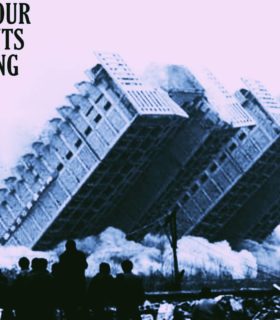Controversy has surrounded the Scorsese inspired Joker since the moment it was announced. Even the US military is making a joke of itself by declaring a warning. At every turn, progressives and leftists have attempted to spin it into a white incel terrorist wet dream. Meanwhile, the right has depicted it as the ultimate “We Live in a Society” movie with the usual memes depicting it as incel gamer representation. How interesting, and how usual, that both were a whole lot of wrong and a little bit right. This is the very beauty of this profound film, and in that in its way it is a Rorschach test. Not of pure subjectivity, only that both the far left and far right are both quite correct to an extent in their interpretation.
In the beginning, Scorsese was on board with the production. After some time he dropped out of the project, but the inspiration from both King of Comedy and Taxi Driver is clearly felt. The usual ‘dirty streets of the nihilistic city’ aesthetic which is common of his movies is in full effect. Aside from these influences, there are also similarities to the cult classic The Machinist, in that the character becomes an unreliable narrative due to mental ailments and the obvious unhealthy skinniness. With that being said, to set the aesthetic context, I find this interpretation of the Joker to be less the Joker, and more a man possessed by the spirit of the Joker. It is a Scorsese film for our time, and it is positively refreshing to see a comic book movie with actual depth and profundity, rather than the plastic and shallow mass-manufactured fodder of Disney Marvel movies that have plagued the box office for years.
Phoenix’s acting is every bit as powerful as Ledger’s, and one hopes the madness of method acting does not take its toll too heavily. One can go on endlessly about which Joker is better, and the layers upon layers of each. I will succinctly say that while Ledger’s did embody the lethal deadliness, he fell short of the childlike gleeful abandonment. And while Phoenix almost—but not quite—attempted to capture the childlike gleeful abandonment, he fell short of capturing the lethal deadliness. At times both seemed to more embody the character Anarky than they did the Joker. Both were nonetheless fully influenced by the spirit of the Joker. Honestly, we have yet to see the Joker in the truest on the cinema screen.
In Phoenix’s depiction, I would say he was possessed by the Joker in the most literal sense. The compulsive laughter came across as like a spirit attempting to free itself, a madness that was tired of being restrained, and the more Arthur (his actual name) gave into the spirit of the Joker, the less the laughter was so compulsive. It was as if the spirit of the Joker was attempting to teach this lowly pathetic man how to take his power back and how to have agency, while at the same time consuming him. One could almost say it came across as symbiotic, but consuming all the same. For as Arthur says “the laughter is the real me.” As powerful as this performance was, instead of a pathetic man who goes from self-pity to the sheer murderous and most feared Gotham villain that is the Joker, he is more a self-pitying man that never overcomes self-pity, but does indeed get the last laugh.
That very last laugh is truly what matters in this film. It is the hammer that falls at the end which delivers the whole punchline of the film.
(the following will contain spoilers)
Who is the enemy really?
It is most fascinating that the people who dislike this film the most are progressives shilling for the establishment, and those on the right/dissident right who either rush to defend the very ones who hang them out to dry, or worse yet, those so naive that they still believe change will come about through voting or rallying behind the loudest panderer.
Joker is an accelerationist love song, which is the primary theme of this film. It is about the downtrodden working-class man being spit on by the ‘bootstrap’ wealthy, a society that is getting crazier, how people are taking notice, and the smile one has as that pressure cooker society receives its final spark and descends into violent unstable chaos. I would venture to go as far as to say Joker himself is simply a vehicle for this greater message. It is less a movie about the birth of Joker, as it is a movie about the birth of Gotham City as we know it.
The right has called it leftist, and the left has called it right-wing. Both play themselves as clowns unable to see the greater theme.
Much of the film fixates on the Wayne Family. This is necessary to pull it into the comic book universe, and the revelations add to any possible reasoning as to why the Joker is obsessed with Batman. There are some who say Thomas Wayne is depicted as a typical ‘social program’ expanding neoliberal, which is a relevant issue seeing as mental health services are cut, adding to the theme of indifference toward the working class. Others have said that Wayne comes across as a version of Trump. I believe that he was purposely depicted ambiguously, which was a genius move. Thomas Wayne does give a cliche bootstrap speech which puts him firmly in the wealthy GOP category, but at the same time, he is running for mayor on the platform of increasing social programs. I find any comparison of him to Trump to be typical grasping at straws. Thomas Wayne is far more conservative and intelligent in behavior. Earlier in the film, Arthur murders three pompous wall street bullies in the subway and is hailed a populist hero for vigilante justice. Thomas Wayne condemns this, says they were upstanding individuals, and states many of the poor simply resent the rich due to their hard work. He then goes on to refer to these populists as clowns. Hence begins the mass protests of Wayne and protestors dressed as clowns, which eventually descends into the city-wide violent chaos we know Gotham for.
Other smears against Thomas Wayne are made, such as the possibility he is Arthur’s father, and that he forged adoption paperwork onto his mentally ill mother to avoid taking responsibility. This is yet another stereotypical wealthy person’s behavior, which of course this can be jarring for fans. Thomas Wayne has always been depicted as a philanthropist of the city, beloved by all except equally wealthy and greedy opposition. Perhaps we have all been coddled too much by this overly positive display of the Wayne Family? Realistically, do the wealthy not have their fair share of skeletons in the closet? Do we really believe the Wayne Family is the exception here? Personally, I found this ‘anti-Wayne’ sentiment to be powerful, whether one believes it to be true or not, and it is delightful to have a counter-position shown rather than the usual narrative.
During one scene which is the final spark to the fire, the Joker gives a speech on the late show. He is angry that the host only has him on to mock him. There is also a ‘church lady prudent’ doctor on the show who makes the comment “You can’t joke about that!” regarding an off-color joke. This gives one the impression that perhaps the late show host embodies the generalized progressive Jimmy Kimmels, yet another tool of the establishment. This doctor represents the censorial progressives who police speech and humor with all the temperament of a prudent church lady. Given that I found the speech underwhelming, whiny, and still more Arthur than Joker, the gunshot was all too deserving and satisfying. The violence in this movie is little and minimal, but when it is done it is done profoundly and powerfully.
It is up to interpretation whether it is this act or the shooting of a protestor by a cop that is the spark which sets off the descent into chaos, or if perhaps it is both. The unreliable narrative aspect permeates throughout, but such questions can be asked ad nauseam and add little to the discussion. It is this descent into chaos, with fires being set, car wrecks, and police being beat down, where we finally see the birth of the Gotham City we have always known.
This decline into chaos is also what triggers the most impactful scene in all of Batman comics, which I will not say outright, only that it truly is the punchline worthy of a smile and is the real last laugh.
Accelerationist Love Song
The far-left worth their salt will see Joker as a class warfare manifesto of the downtrodden masses rising up against the wealthy. The far-right worth their salt will see this as the ‘done with crazy society’ working-class white man gutting the Republican GOP wealthy who would sooner hang them out to dry. (and have)
Yet the Joker himself is not political—he states this—and the Joker has never been political. He is not preaching egalitarianism, nor identity, and seems to be a nihilist or a Stirnerite unconcerned with the political spectacle, only the schadenfreude of it all. The Joker has always been obsessively driven by being the counter-chaos to Batman’s order. Of course the basic right will knee jerk-respond with “it is another Hollywood movie, so of course it is pushing Bolsheviks!” to which the basic left responds “Yay Bolsheviks!” Perhaps both can put aside being ideologues to acknowledge that this film simply doesn’t care about your political hang-ups. It is mired in unreliable narration and ambiguity for this very reason.
Accelerationism, in the harsh sense, is concerned with speeding up this decline, in order to speed up the descent into chaos and collapse. Politically speaking, it is meant to speed up the descent into the inevitable balkanization to come. Is accelerationism really so if it is being monetized by a box office film? Is this genuine accelerationism or simply an engineered attempt to spark accelerationist acts for duplicitous reasons? These are both questions worthy of discussion, and yet, accelerationism is funny in that neither of these questions would exclude the objective regardless. (only possibly hasten it, if hastening is truly possible)
What speaks volumes are the pathetic on the dissident right who would sooner rush to defend the ‘Thomas Waynes’, the very ones who have done nothing but hung them out to dry as they have been censored and doxxed every step of the way. The very ones that if the left pulled a ‘red flag’ or a ‘Minority Report’ would sooner shrug as the dissident right were carted off to prison or worse. But do defend those ‘Thomas Waynes’, rush to their feet when they are attacked, they expect as much. This isn’t far removed from the basic perspective that ‘accelerationism is defeatism’ and that surely one more election cycle will bring about a true cultural renaissance of sorts.
This is only matched by the usual movie critic or late-night host who eats up the shallow establishment propaganda of a Marvel or Disney film and yet recoils at a film which points out that perhaps society is on the severe decline and that an endless stack of Funko Pop figurines doesn’t change this. If you still take the critic score at Rotten Tomatoes seriously at this point, you should reassess yourself. Frankly, it is refreshing to see a comic book movie worth a damn again. It has been far too long.
In conclusion, Joker may not be a Scorsese film but it lives up to his name. Phoenix may not be the same as Ledger, but his performance is just as powerful. It is not the Joker, but it is another intriguing interpretation of the Joker. It is neither left nor right. It is simply, and violently, accelerationist.
Natasha Maria is the Community Manager of Trigger Warning. She is an egoist, occultist, and esoteric philosopher with interests ranging from archeofuturism to transhumanism to horror fiction. She enjoys long romantic walks through the abyss.


